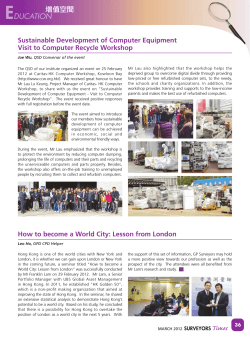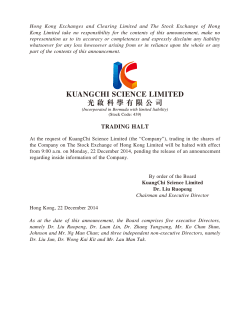
LEGISLATIVE COUNCIL BRIEF Clearing and Settlement Systems
File Ref: B&M/2/1/20C LEGISLATIVE COUNCIL BRIEF Clearing and Settlement Systems Ordinance (Chapter 584) Clearing and Settlement Systems (Amendment) Bill 2015 INTRODUCTION At the meeting of the Executive Council on 20 January 2015, the Council ADVISED and the Chief Executive ORDERED that the Clearing and Settlement Systems (Amendment) Bill 2015 (“the Bill”), at Annex, should be introduced into the Legislative Council (“LegCo”) to establish a regulatory regime for stored value facilities1 (“SVF”) and retail payment systems2 (“RPS”) in Hong Kong. JUSTIFICATIONS Development in the retail payment market 2. The global retail payment market has been developing rapidly. Technological advancements and increasing acceptance of new technologies by the public have led to the emergence of new forms of retail payment products and services, such as stored value payment cards, online stored value payment facilities, and Internet or mobile payment services. In Hong Kong, there has been a growth in such products and services being offered to the public in recent years. 1 SVF can be classified into two broad categories according to the scope of their usage, viz. multi-purpose and single-purpose SVF. Multi-purpose SVF can be used as a means of payment for goods or services provided by the issuer or third-party participating merchants at designated locations and points, or for person-to-person payments. Examples include the Octopus Cards and the increasingly popular online stored value payment facilities. Single-purpose SVF is used as a means of payment for goods or services provided by the issuer of the SVF only (e.g. prepaid coupons issued by cake shops or coffee shops). 2 RPS means a system or an arrangement for the transfer, clearing or settlement of payment obligations relating to retail activities, principally by individuals, that involves purchases or payments, and includes the related instruments and procedures. RPS generally covers credit card schemes, debit card schemes, large merchant acquirers, and payment gateways, etc., in which the payment systems do not hold accounts for maintaining funds for users. 1 3. The current regulatory regime for stored value cards under the Banking Ordinance (Chapter 155) (“BO”) only applies to device-based multi-purpose stored value products. In addition, the Clearing and Settlement Systems Ordinance (“CSSO”) provides a statutory framework for the Hong Kong Monetary Authority (“HKMA”) to designate and oversee large-value clearing and settlement systems3 (“CSS”). Nonetheless, the current regulatory regime in the BO or CSSO does not cover a range of non-device-based payment facilities (which are normally issued outside the banking sector, and store value on network-based accounts, mobile network accounts or computer servers), as well as payment systems related to retail activities. To ensure the safety and soundness of these payment facilities and systems insofar as they relate to financial stability, we propose bringing them into the regulatory net of the HKMA under the CSSO. Given the enlarged ambit of the CSSO as proposed in the Bill, we propose that the Ordinance be renamed the “Payment Systems and Stored Value Facilities Ordinance”. Proposed Regulatory Regime (A) Regulatory regime for SVF 4. The primary regulatory concern of SVF stems from the need to protect users’ float4 maintained by SVF issuers. To ensure the ability and competence of SVF issuers and the proper protection and management of the float, we propose introducing a mandatory licensing regime for SVF, so that no person may issue, or facilitate the issue of, SVF in Hong Kong without a licence granted by the HKMA. It will be a criminal offence to issue, or facilitate the issue of, SVF without being authorized by a licence. Coverage 5. The proposed licensing regime will cover both device-based and nondevice-based multi-purpose SVF. Single-purpose SVF will remain not subject to regulation – an arrangement in line with the existing “multi-purpose cards” regime under the BO5, as well as the practices adopted by major overseas 3 Large-value CSS refer to the systems established for the clearing and settlement of transfer of funds or securities among financial institutions. Examples of designated CSS are the Hong Kong Dollar Real Time Gross Settlement (“RTGS”) System, US Dollar RTGS System, Euro RTGS System, and Renminbi RTGS System, Central Moneymarkets Unit, and Continuous Linked Settlement System. 4 “Float” refers to the total sum of money paid by a user to an issuer, including any other sums of money received on the amount of the users, for storage on SVF. That said, the “float” of a SVF will be outside the definition of “deposit” under the BO and the Deposit Protection Scheme Ordinance (Chapter 581). 5 Section 14A of the BO provides that only Authorized Institutions (“AIs”) are permitted to issue or facilitate the issue of a multi-purpose card, which is a stored value card other than a single-purpose card. The existing provisions under the BO do not cover multi-purpose cards issued in a form other than a device-based facility (i.e. not taking a “card” form) and operated by a non-AI issuer mostly via the Internet. 2 jurisdictions. Indeed, single-purpose SVF are in essence bilateral contractual arrangements between service vendors and their respective users for advance payment for specific goods or services. Given its bilateral nature and magnitude, the degree of “moneyness” entailed by single-purpose SVF is minimal, posing insignificant risks to the payment and financial systems of Hong Kong6. In addition, if the proposed licensing regime is to be imposed on single-purpose SVF, most of the existing single-purpose SVF may be driven out of business due to regulatory obligations and costs. 6. In addition, to ring-fence the proposed regulatory regime to relevant payment facilities essential to financial stability, we propose that SVF which do not involve payment of money by users or have limited usage be excluded from the regulatory regime. The exclusion will apply to loyalty and bonus point schemes with cash reward or involving limited users’ cash elements, single online store platform, as well as SVF with limited usage (say, those used within limited group of goods or service providers, or within certain premises) and a float size of not more than HK$1 million. 7. Notwithstanding the exclusion referred to in paragraphs 5 and 6 above, similar to the existing “multi-purpose cards” regime under the BO, the HKMA will retain the power to exempt an SVF from the regulatory regime, having regard to the materiality of the risk posed by the relevant facility to the users or potential users, and the payment or financial systems in Hong Kong7. The HKMA may attach conditions to the exemption. Licensing criteria 8. The proposed licensing criteria for multi-purpose SVF will include the following major elements – (a) Physical presence in Hong Kong: A licensee must be a body corporate under Hong Kong law and have a registered office in Hong Kong. This requirement will allow the HKMA to exercise effective supervision over the licensee even though some of its systems and operations are located outside Hong Kong, or services are provided through the Internet; 6 Nevertheless, there are laws in place to protect consumers in the course of general trade transactions that may involve single-purpose SVF. The relevant consumer protection legislation includes the Sale of Goods Ordinance (Chapter 26), the Trade Descriptions Ordinance (Chapter 362), the Control of Exemption Clauses Ordinance (Chapter 71), the Supply of Services (Implied Terms) Ordinance (Chapter 457), and the Unconscionable Contracts Ordinance (Chapter 458). 7 We envisage that facilities which can only be used within, or in close proximity to, the issuer’s premises, or for the purchase of a limited range of goods or services by a limited group of people, might be eligible for exemption. Examples may include petrol cards for refuelling or purchasing goods provided by a few other providers at a specified chain of petrol stations, and membership cards which can only be used to pay for goods or services offered by a few shops, clubs or organisations. 3 (b) Principal business: The principal business of a licensee must be the issuance of SVF to ensure that the principal resources will only be used on its SVF business. Some SVF schemes may involve the provision of remittance or money changing service as an ancillary or incidental service to the SVF business, potentially falling into the existing licensing regime for “money services operators” (“MSO”) administered by the Customs and Excise Department (“C&ED”) under the AntiMoney Laundering and Counter-Terrorist Financing (Financial Institutions) Ordinance (Chapter 615) (“AMLO”). To avoid any regulatory overlap, the licensee whose operation involves a MSO business which is ancillary or incidental to its SVF business will only need to obtain an SVF licence from the HKMA and will not be required to obtain a MSO licence from the C&ED; (c) Financial strength: The licensee must meet a minimum on-going capital requirement, so that the aggregate amount of its paid-up capital should not be less than HK$25 million. This is in line with the current regulatory regime for “multi-purpose cards” under the BO in which case a non-bank multi-purpose card issuer must be authorized as a deposit-taking company and be subject to, among other things, a minimum level of share capital of HK$25 million; (d) Management of float: A licensee will be required to have in place safeguarding measures that adequately protect the float, and to keep the float separate from other funds of the issuer8. The licensee must also have adequate risk management policies and procedures for float management to ensure that there will be sufficient funds for the redemption of outstanding stored value; and (e) “Fit and proper” ownership and management, as well as prudential risk management requirements: Controllers, directors, and chief executives of SVF licensees must be fit and proper persons, and persons responsible for the management of the SVF business must possess appropriate knowledge and experiences. The licensee must have in place appropriate risk management policies and procedures for its operation commensurate with the scale, risk profile and complexity of the scheme. 8 We propose in the Bill that the HKMA may approve, as licensing conditions for an SVF issuer, the float protection arrangements, on a case-by-case basis, taking into account factors including financial strength, scale of business, risk management, and internal control environment, etc. of each scheme. The HKMA will need to be satisfied that the types of investment in which the licensee proposes to invest are appropriate, having regard to the nature of the investments, and also, the financial strength, overall corporate governance, and risk management controls of the SVF issuer. 4 9. In line with the existing “multi-purpose cards” regime under the BO, licensed banks will be deemed to be licensed to issue SVF as a line of business. This, together with other lines of banking business in a licensed bank, will be subject to regulatory requirements and on-going supervision by the HKMA on a consolidated basis. Nevertheless, licensed banks will still be required to comply with relevant requirements under the proposed regulatory regime, including float safeguarding and management, should they decide to continue, or embark on, SVF business. (B) Regulatory Regime for RPS 10. Safe and efficient functioning of widely-used RPS is essential to the smooth running of day-to-day economic activities in Hong Kong. Having regard to the existing regulatory regime for large-value CSS under the CSSO, we propose extending that regime to cover RPS as appropriate9. An RPS which operates in Hong Kong or processes retail payment transactions denominated in Hong Kong dollar or other currencies or a declared medium of exchange may be designated under the proposed regime if certain designation criteria (set out in paragraphs 11 and 12 below) are met by such a system. Designation criteria 11. Like large-value CSS, we propose that the HKMA’s oversight for RPS will be conducted through a “designation system”. This will mean that the HKMA may designate certain RPS available in the market for the sake of imposing a set of prudential requirements over them. We propose that the HKMA may designate an RPS10 if any disruptions to the RPS are likely to result in any or more of the following – (a) monetary or financial stability, or the functioning of Hong Kong as an international financial centre, being adversely affected; (b) the public’s confidence in payment systems or the financial system of Hong Kong being adversely affected; or (c) day-to-day commercial activities being adversely and materially affected. 9 While the CSSO provides, at present, statutory backing to the finality of settlement for transactions made through the designated CSS by protecting the settlement finality from insolvency laws or any other laws, the finality of settlement will not apply to RPS in future. 10 We are aware that an SVF normally requires a CSS to support its operation. Such a system may fall within the definition of RPS. To avoid regulatory overlap, we do not intend to designate CSS run by a SVF licensee to support its own SVF scheme. However, if the RPS operated by a SVF issuer supports SVF scheme run by other issuers, the HKMA may designate such RPS if it meets the designation criteria. 5 12. In applying the above proposed designation criteria, the HKMA may take into account factors, including (a) the estimated aggregate value of orders transferred, cleared or settled through the system; (b) the estimated average value of orders transferred, cleared or settled through the system; (c) the estimated number of orders transferred, cleared or settled through the system; (d) the estimated number of participants of the system; and (e) any direct or indirect interfaces to the large-value payment systems. Prudential requirements on designated RPS 13. We propose that designated RPS will be subject to the HKMA’s oversight. To ensure their safety and robustness, they will be required to have in place operating rules to provide for the system to be operated in accordance with the requirements, including default arrangements which are appropriate for the system. Designated RPS will also be subject to safety requirements, which include, among other things, risk management and control procedures relating to the operation of the system; safety and integrity of information held within the system; soundness of the system including financial soundness; and efficiency requirements including costs of participation and reasonableness of criteria for admission as a participant in the system. Supervisory and enforcement powers of the HKMA 14. To enable the HKMA to perform various day-to-day supervisory functions over SVF and designated systems, we propose incorporating in the CSSO provisions enabling the HKMA to conduct effective on-going supervision over the relevant licensees and operators (including on-site examinations and off-site reviews), gather information, give directions, impose operating rules, make regulations, and issue guidelines, etc. 15. We also propose that the HKMA be empowered to conduct investigation into SVF licensees and designated systems when the HKMA has a reasonable cause to believe that an offence has been committed in connection with the proposed regulatory regime11. 11 We propose that the HKMA be given the power to direct an investigator to conduct investigation, the power to compel provision of evidence from all persons relevant to the suspected contravention, the power to inspect records or documents taken in possession for the purpose of an investigation, the power to require persons to render assistance in connection with the investigation, and the power to apply to a Magistrate for search warrants and seizures when necessary. 6 16. We propose modelling on the existing criminal sanctions under the BO and the CSSO for devising sanctions under the proposed regulatory regime. In addition, we propose empowering the HKMA to impose a range of civil sanctions 12 , which will be proportionate to the nature and severity of the misconduct, under the proposed regulatory regime. 17. To ensure that the exercise of the HKMA’s powers is subject to checks and balances, we propose expanding the ambit of the existing Clearing and Settlement Systems Appeals Tribunal to cover appeals against relevant HKMA’s decisions in relation to SVF and RPS. The existing Process Review Committee will continue to review the processes and procedures adopted by the HKMA in applying supervisory standards13. Phased implementation arrangement 18. We propose implementing the provisions contained in the Bill in two phases after the passage of the Bill by LegCo. Phase one (which mainly concerns the provisions relating to the application and processing of SVF licences, as well as the designation regime of RPS) will come into operation upon gazettal of the Amendment Ordinance. Phase two (which mainly concerns the provisions relating to offences in relation to the proposed licensing regime for SVF) will come into operation one year after the commencement of Phase one. This is intended to cater for the time required for potential and existing SVF issuers to apply for a licence, as well as for the HKMA to process the SVF licence applications. Pre-existing SVF operators at the time of the commencement of phase one may continue their SVF business during the oneyear transitional period before the commencement of phase two. However, unless they will exit the industry during the transitional period, these preexisting SVF operators must complete their licence application process during the transitional period and obtain a SVF licence to take effect upon the commencement of phase two. 12 The proposed civil and supervisory sanctions include – (a) minor sanctions (such as caution, warning, reprimand, and order to take specified actions(s), etc.) and supervisory sanctions (such as temporary suspension, suspension or revocation of licence, or a combination of the above); (b) pecuniary penalty of not exceeding HK$10 million or three times the amount profit gained or loss avoided, whichever is higher, or (c) any combination of the above. 13 The Process Review Committee reviews and advises the HKMA on the adequacy of the HKMA’s internal operational procedures and guidelines for applying the standards set under the CSSO to those designated systems in which the HKMA has a legal or beneficial interest. It seeks to ensure that the same set of standards is applied to all designated systems, whether or not the HKMA has an interest in them. 7 THE BILL 19. The main provisions of the Bill are as follows – (a) Clauses 3 and 4 change the long and short titles of the CSSO; (b) Clauses 10 to 15 provide for the designation and oversight by the HKMA of RPS, including the designation criteria, and the regulatory requirements on the designated systems (paragraphs 10 to 13 above); (c) Clauses 17 and 53 introduce a new Part 2A and new Schedules 3 to 8 respectively to the CSSO to provide for the licensing and supervision of SVF (paragraphs 4 to 9 above), including the following – (i) the licensing criteria for SVF issuers and facilitators are set out in the new Schedule 3 (paragraph 8 above); (ii) the licence fee is specified in the new Schedule 4; (iii) the grounds for revoking a licence are specified in the new Schedule 5; (iv) the affairs or businesses that the manager of a licensee is responsible for are specified in the new Schedule 6; (v) the powers of the Manager are specified in the new Schedule 7; and (vi) the SVF that are exempt as mentioned in paragraph 6 above are specified in the new Schedule 8. (d) Clauses 18 to 23 renumber existing Division 3 of Part 2 of the CSSO as Part 2B and amend that Part 2B to provide for matters pertaining to HKMA’s day-to-day supervisory functions (paragraph 14 above); (e) Clause 29 introduces – (i) a new Part 3A to provide for the HKMA’s power to investigate an alleged contravention of provisions of the CSSO and matter pertaining to such investigations (paragraph 15 above); and (ii) a new Part 3B to provide for civil sanctions for contraventions under the CSSO. The new sections 33K to 33R provide for the imposition of civil sanctions on regulated persons for contraventions of any provisions of the CSSO (paragraph 16 above); 8 (f) Clause 53 introduces a new Schedule 9 to set out the savings and transitional arrangements for the existing Clearing and Settlement Systems Appeals Tribunal and Gazette notices published under existing provisions of the CSSO; and (g) Part 3 deals with certain related and consequential amendments to the BO, the Electronic Transactions Ordinance (Chapter 553) and the AMLO. LEGISLATIVE TIMETABLE 20. The legislative timetable will be – Publication in the Gazette 23 January 2015 First Reading and commencement of Second Reading debate 4 February 2015 Resumption of Second Reading debate, committee stage and Third Reading to be notified IMPLICATIONS OF THE PROPOSAL 21. The Bill is in conformity with the Basic Law, including the provisions concerning human rights. It has insignificant sustainability implications, and no productivity, environmental, civil service, financial, or family implications. The amendments proposed in the Bill will not affect the current binding effect of the CSSO. Economic implications 22. The proposed regulatory framework will help enhance the safety and soundness of stored value facilities and retail payment systems, thereby strengthening the public’s confidence in these products and services and fostering their further development and innovation. By upgrading the retail payment legislation in line with the same developments in other major financial centres, the proposal will also help maintain Hong Kong's status as an international financial centre. 9 PUBLIC CONSULTATION 23. The Administration launched a three-month public consultation on the proposed regulatory regime in May 2013. Altogether 41 responses were received from a broad range of interested parties, including market players, public bodies, business and professional organisations, and several information technology industry associations. Comments received indicated overall support for the policy objectives and the key proposals. Most respondents generally consider that a well-regulated environment will help further develop retail payment products and services in Hong Kong, and enhance users’ acceptance of and confidence in such products and services. We have taken on board many useful suggestions and comments, after balancing relevant perspectives (in terms of market development, evolving market needs, protection for users, and level-playing field considerations), in contemplating the Bill, particularly in respect of the coverage of the regulatory regime, the licensing criteria and conditions, as well as the relevant transitional arrangements. We issued a Consultation Conclusion to address these suggestions and comments on 31 October 2014. 24. We briefed the LegCo Panel on Financial Affairs on the major elements of the proposed regulatory regime at its meeting on 7 April 2014. The Panel supported the Administration’s plan to establish a regulatory framework for SVF and RPS in Hong Kong. Questions were raised in relation to the supervision over the SVF issuers soliciting Hong Kong users without maintaining a local presence, the regulatory treatment for single-purposed SVF, and the protection of personal data collected by relevant operators. The Bill has specified provisions to address the above aspects. After the passage of the Bill, the HKMA will issue relevant supervisory guidelines where appropriate in due course to facilitate compliance and enforcement. PUBLICITY 25. We will issue a LegCo brief and a press release upon gazettal of the Bill, and arrange a spokesperson to answer media enquiries. ENQUIRIES 26. Enquiries relating to the brief can be directed to Mr Jackie Liu, Principal Assistant Secretary for Financial Services and the Treasury (Financial Services), at 2810 2067. Financial Services and the Treasury Bureau 21 January 2015 10 Annex
© Copyright 2025










